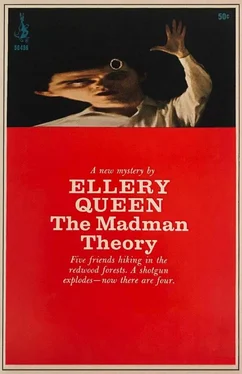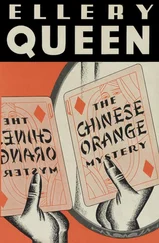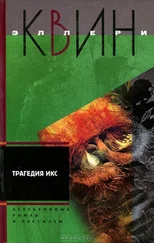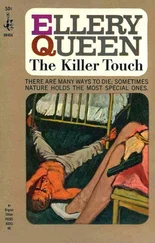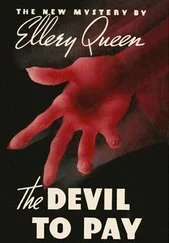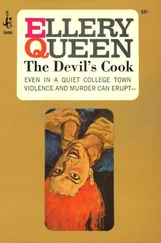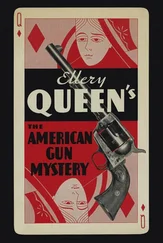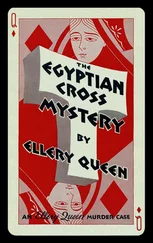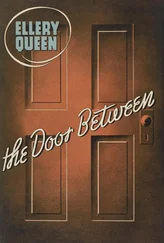Эллери Куин - The Madman Theory
Здесь есть возможность читать онлайн «Эллери Куин - The Madman Theory» весь текст электронной книги совершенно бесплатно (целиком полную версию без сокращений). В некоторых случаях можно слушать аудио, скачать через торрент в формате fb2 и присутствует краткое содержание. Город: New York, Год выпуска: 1966, Издательство: Pocket Books, Жанр: Криминальный детектив, на английском языке. Описание произведения, (предисловие) а так же отзывы посетителей доступны на портале библиотеки ЛибКат.
- Название:The Madman Theory
- Автор:
- Издательство:Pocket Books
- Жанр:
- Год:1966
- Город:New York
- ISBN:нет данных
- Рейтинг книги:5 / 5. Голосов: 1
-
Избранное:Добавить в избранное
- Отзывы:
-
Ваша оценка:
- 100
- 1
- 2
- 3
- 4
- 5
The Madman Theory: краткое содержание, описание и аннотация
Предлагаем к чтению аннотацию, описание, краткое содержание или предисловие (зависит от того, что написал сам автор книги «The Madman Theory»). Если вы не нашли необходимую информацию о книге — напишите в комментариях, мы постараемся отыскать её.
But Inspector Omar Collins, lean, gloomy-eyed, black-haired, was a painstaking man.
The more he pursued it, the less he believed in The Madman Theory.
The Madman Theory — читать онлайн бесплатно полную книгу (весь текст) целиком
Ниже представлен текст книги, разбитый по страницам. Система сохранения места последней прочитанной страницы, позволяет с удобством читать онлайн бесплатно книгу «The Madman Theory», без необходимости каждый раз заново искать на чём Вы остановились. Поставьте закладку, и сможете в любой момент перейти на страницу, на которой закончили чтение.
Интервал:
Закладка:
Red Kershaw had a listing.
Robert Vega and Westco were listed.
None was 363-2210.
Buck James was not represented in the directory. But James had already, at Cedar Grove, given his number to Collins. It was not 363-2210.
Collins dialed Myron Retwig’s home number. Retwig answered, and Collins asked if he had a few minutes free. Retwig said he did, and gave directions how to reach his home.
He lived on the summit of a hill west of San Jose, the Coast Range bulking up behind. His house was an enormous three-story box, with a high mansard roof broken by dormers and chimneys at either end. A copse of tall black cypresses at the rear comprised the landscaping; there was no trace of a garden.
Retwig answered the door in tan trousers and a faded blue work-shirt. With his round brown face, stiff gray hair and owlish look, he seemed not so much the owner of the house as its gardener or handyman.
He took Collins in. The place was furnished with heavy, comfortable furniture: leather chairs, an ancient leather-upholstered sofa, a massive table supporting a two-foot globe. The house seemed unnaturally quiet. Retwig said by way of explanation, “I’m alone today. My wife is in San Francisco, my sons are at Monterey for the regatta. Is it too early for a drink?”
“I wouldn’t say so.”
Retwig went to a cabinet, mixed a pair of highballs. Over his shoulder he asked, “How is the investigation coming?”
“Not too badly,” said Collins. “Cases like this are solved by hard-nosed plugging.”
Retwig nodded. “This is true in almost any endeavor.”
“There’s been one interesting development,” said Collins with an air of candor. “It concerns a certain Steve Ricks. Is that name familiar to you?”
Retwig considered carefully. “It is, in the sense that you already have asked me the same question. Otherwise, to the best of my knowledge, I have never heard the name.”
Collins nodded, as if Retwig had uttered a profound truth. “I hoped that you might have remembered a reference to him. We have reason to believe that he’s linked with Mr. Genneman.”
Retwig made no comment.
“Jean Genneman seems to recall the name,” mused Collins. “But she can’t remember from where.”
“It’s not an unusual name.”
“True. Look, Mr. Retwig, I’d like you to talk to me frankly about the Genneman family. In complete confidence, and for the sake of background, what was the state of affairs in the Genneman household?”
Retwig half smiled. “If I say nothing, I obstruct justice. If I talk freely, I become a gossip. You put me in an uncomfortable position, Inspector.”
“I realize that,” said Collins. “I make the request only because it may bring Mr. Genneman’s murderer to justice. Please?”
Retwig deliberated. Then he said, “I can’t tell you a great deal, because there isn’t much to tell. Earl and Opal seemed quite happy together. She was clever enough, or kind enough, to complement him — bring out the best in him. A less understanding and subtle woman might have made Earl’s life hell.”
“How so?”
“Earl was a positive man. He made decisions by a process which represented subconscious but perfectly accurate logic, but which might be mistaken for pigheadedness. Opal understood this.”
“What of Earl Junior?”
Retwig pursed his lips, “I’d say that in that department Earl did as good a job as anyone could. I am not a Freudian, thank God, and I can’t even guess at the shape of young Earl’s thoughts. But it would be wrong to blame the father for the son.”
“They didn’t have a good relationship?”
“I wouldn’t say so, no.”
“Where did Mrs. Genneman stand in all this?”
“In my opinion, Opal has behaved admirably. He may change with maturity, but as of now I consider Earl Junior pretty unprepossessing.”
“I appreciate your frankness,” said Collins. “Now, as to Jean?”
“No mystery there. She’s exactly what she appears: a healthy young woman with a strong personality.”
“She and her stepfather were on good terms?”
“Very much so. Earl gave her the affection he would have given his own flesh and blood. She felt the same toward him.”
“What’s the story between Jean and Buck James?”
“It’s beyond my understanding. Buck was graduated from the University of Wisconsin and came to Stanford for graduate work. He met Jean, they became engaged. Earl approved the match and gave Buck a job with Westco. Then the romance cooled and the two drifted apart. What I suspect is that Jean wanted to get married immediately, whereas Buck wanted to wait until he was independent, or at least out from under Earl’s shadow. He liked and respected Earl — but Earl had a very dominating personality, and if he disapproved of something he did so vehemently, to say the least. Earl was a good friend. He could also be a bad enemy.”
“And you, Mr. Retwig — why did you leave Genneman Pharmaceuticals?”
“For something of the same reasons which, in my opinion, dissuaded Buck from an early marriage with Jean. And because I was offered a more responsible job at more money.”
“But now you’re back working for Genneman Pharmaceuticals.”
“Opal offered me a better job with more money than my job with Pacific; and Earl is no longer around to demoralize me with his off-the-cuff — and accurate — decisions. You see,” said Retwig with a faint smile, “I’m the thinking-man type. I weigh and ponder, I project trends, I calculate probabilities — I eliminate the less promising courses of action and finally arrive at one which I regard as optimum. All that takes time. Earl would reach the same decision in half a second... I explained this to him when I left Genneman Laboratories, and he was greatly amused.”
“I understand you both were interested in model railroading,” said Collins, “that it was the basis of your friendship.”
“It was a mutual interest, certainly. Have you seen Earl’s set-up?”
“Mrs. Genneman showed it to me.”
“What did you think of it?” For the first time Retwig seemed to speak without calculation.
“I said to myself: how I wish I’d had something like this when I was a boy.”
Retwig jumped to his feet. “Take a look at mine.”
He slid back a door, snapped a set of switches. Collins took his drink and followed.
“Up four steps, Inspector. Don’t trip.”
The steps rose to a walkway that encircled a room twenty feet square. The layout occupied the entire floor, with tracks wandering through a miniature landscape. Collins stared in wonder. If Earl Genneman’s layout had been impressive, this was a marvel. There was a central area divided into four sectors, each tinted a different color: purple, yellow, red and blue. At the center was a city of domes, towers and palaces, all fashioned of brilliant green glass.
Retwig watched Collins with a smile. “Do you recognize it?”
Collins nodded slowly. “It’s the Land of Oz, by golly. I haven’t thought of it for — well, a long time.”
“I probably know more about Oz than any man alive. The research I have put into this project, the money I’ve spent! And here it all is. The Land of Oz. The blue Munchkin country, the yellow land of the Winkies, the red Quadling country, the purple Gillikin country, the Emerald City at the center. There’s the Tin Woodsman’s castle, and there’s the palace of Glinda the Good. Notice the cottage where Tip lived with Mombi the Witch. There’s Foxville, and Bunbury, and Bunnybury. Over there is the Nonestic Ocean — I’m sorry I don’t have room for the islands of Pingaree, Regos, Coregos and Phreex. Below is the Deadly Desert and the Land of Ev. The Nomes work underneath the mountains; in the crags live the Whimsies, the Growleywogs and the Phanfasms. I’ve used the O’Neill illustrations faithfully. In fact the only false note is the railroads themselves. Baum would have disapproved. Still, they’re the excuse for all this, and I’ve kept them in character.”
Читать дальшеИнтервал:
Закладка:
Похожие книги на «The Madman Theory»
Представляем Вашему вниманию похожие книги на «The Madman Theory» списком для выбора. Мы отобрали схожую по названию и смыслу литературу в надежде предоставить читателям больше вариантов отыскать новые, интересные, ещё непрочитанные произведения.
Обсуждение, отзывы о книге «The Madman Theory» и просто собственные мнения читателей. Оставьте ваши комментарии, напишите, что Вы думаете о произведении, его смысле или главных героях. Укажите что конкретно понравилось, а что нет, и почему Вы так считаете.
